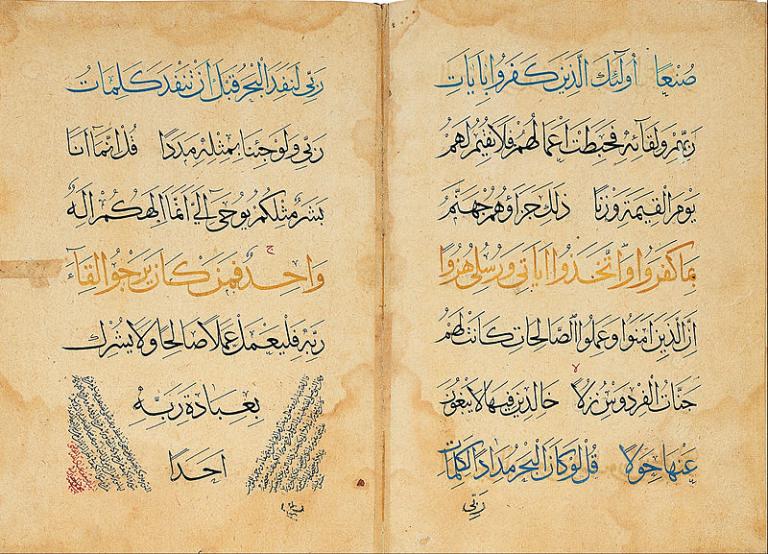
Wikimedia Commons
Building upon two previous entries, here and here, I offer a bit more from the notes that I wrote up, at the request of a committee in Salt Lake City, back in January 2017:
Some Early Translations
English translation of the Qur’an seems to have begun with Christian missionary motivations—all of the earliest translations were done by Christians—and the first efforts often had a polemical edge. Many translation errors were made, and there was frequently an explicit effort to make Islam and the Qur’an look bad.
In 1649, Alexander Ross, chaplain to the King Charles I of England, produced the first translation of the Qur’an into English. But he did it from a French translation. He knew no Arabic. (His French was apparently a bit weak, as well.) And his title well illustrates his intent:
The Alcoran, Translated out of Arabic into French. By the Sieur du Ryer, Lord of Malezair, and Resident for the French King, at ALEXANDRIA. And Newly Englished, for the satisfaction of all that desire to look into the Turkish Vanities.[1]
Ross had done his translation, he said, “that so viewing thine enemies in their full body, thou must the better prepare to encounter . . . his Alcoran.”
Two appendices are attached to Ross’s translation: “A Needful Caveat or Admonition, for them who desire to know what use may be made of or if there be danger in reading the Alcoran” and “The Life and Death of Mahomet: the Prophet of the Turks and author of the Alcoran.”[2]
By the eighteenth and especially the nineteenth century, European colonialism was on the rise, and the Islamic world was on the defensive.
In 1734, the lawyer George Sale produced the first English translation of the Qur’an taken directly from the Arabic. But European knowledge of Arabic was shaky in his time, and he still relied heavily upon a 1698 Latin translation:
Koran, commonly called the Alcoran of Mohammed, tr. into English immediately from the original Arabic; with explanatory notes, taken from the most approved commentators. To which is prefixed a preliminary discourse.
Until recent times, Sale’s translation was far and away the most popular English version and, in fact, it is still in print, with a new edition published as recently as 2009. It has been criticized for omissions, distortions, and hostile interpolations, and its “Preliminary Discourse” sets out principles for converting “Mohammedans” to Christianity.
J. M. Rodwell, an Anglican cleric, published The Koran in London in 1861. The preface to his translation is extremely critical of Muhammad, and his notes are still offensive to Muslim readers.
In the twentieth century, armed with the English that they had learned from their colonial overlords, Muslims—very commonly from the Indian subcontinent—began to produce their own translations, often with the express goal of refuting or at least countering what they saw as offensive European versions.
Thus, Mohammad Abdul Hakim Khan published The Holy Qur’an in 1905, “with short notes based on the Holy Qur’an or the authentic traditions of the Prophet. . . . All fictitious romance, questionable history and disputed theories have been carefully avoided.”
In 1912, Hairat Dehlawi—his last name indicates his connection with Dehli (aka Delhi), in India—and a group under his leadership published The Koran Prepared, which was intended as “a complete and exhaustive reply to the manifold criticisms of the Koran by various Christian authors such as Drs. Sale, Rodwell, Palmer and Sir W. Muir.” (The first three of those authors had produced Qur’an translations; the fourth was a pioneer English biographer of Muhammad.)
None of the early Muslim translations were by trained scholars, though, and, if they retain any importance today, it’s purely historical.
[1] The Arabic definite article is al-, prefixed to its noun. So, in Arabic, the Qur’an is al-Qur’an. (I’m omitting the diacritical marks that we Arabists prefer to use in our transliterations.) That’s where Alcoran comes from. But to speak of the Alcoran is, really, to say the The Qur’an.
[2] The claim that Muhammad was the author of the Qur’an rather than its recipient through divine revelation is deeply offensive to Muslims, much in the same way that orthodox Latter-day Saints are displeased by assertions that Joseph Smith created the Book of Mormon.
***
I’ll be spending the latter part of this month and all of May in the Middle East — in Jordan, Israel, and Egypt. Some of you might be interested, though, in a tour to Egypt that I’ll be involved with at the end of the year:
It’s a great time to go to Egypt — principally because the weather won’t be hot.












